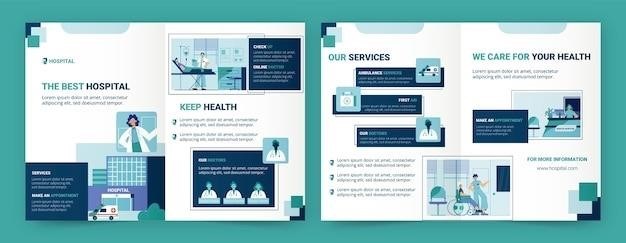Meditech Training Manual PDF⁚ A Comprehensive Guide
This comprehensive guide provides a detailed overview of Meditech training materials available in PDF format. It covers various aspects, including system navigation, order management, user interface understanding, and role-specific training for nurses, physicians, and other healthcare professionals. Access to online resources and troubleshooting tips are also included.
Navigating the complex world of Meditech requires comprehensive training, and readily available PDF manuals are invaluable resources. These manuals offer a structured approach to learning, providing step-by-step instructions and visual aids for better comprehension. They cater to diverse user roles, from nurses and physicians to administrative staff, ensuring everyone gains proficiency in their respective areas. The self-paced nature of these PDF resources allows for flexible learning, fitting seamlessly into busy schedules. Whether it’s mastering order entry, understanding the electronic health record (EHR) system, or delving into advanced functionalities, these manuals act as comprehensive guides. They often include troubleshooting sections, addressing common issues and providing solutions, minimizing disruptions in workflow. Furthermore, many Meditech training PDFs incorporate interactive elements and practice exercises, enhancing the learning experience and reinforcing key concepts. This ensures that users not only understand the software but can also apply their knowledge effectively in real-world scenarios; The availability of these PDFs promotes consistent, high-quality training across all levels of the healthcare organization. The benefits extend beyond individual skill enhancement; they improve overall operational efficiency and patient care.
Accessing and Navigating Meditech Systems
Effective use of Meditech begins with understanding system access and navigation. Meditech training manuals often dedicate sections to detailed login procedures, emphasizing security protocols and password management best practices. These manuals guide users through the initial login process, explaining how to access the system using various methods, such as desktop icons or web portals. Once logged in, navigating the system’s interface is crucial. The manuals provide clear instructions on using menus, toolbars, and function buttons, illustrating how to efficiently move between different modules and applications. They explain the use of search functions, helping users quickly locate specific patient information or system settings. Understanding the system’s organizational structure, including the hierarchy of menus and submenus, is also emphasized. Many manuals provide screenshots and visual guides to illustrate the navigation process, enhancing comprehension. Furthermore, they may highlight keyboard shortcuts and other time-saving techniques, improving user efficiency. The goal is to empower users to confidently and efficiently navigate the system, optimizing their workflow and minimizing time spent searching for information or functions.
Meditech Order Management Training
Meditech order management training, often detailed in dedicated PDF manuals, covers the crucial aspects of placing, modifying, and managing orders within the system. These manuals provide step-by-step instructions for various order types, including medication orders, laboratory tests, and radiology requests. They emphasize the importance of accurate order entry, highlighting the potential consequences of errors and providing strategies for error prevention. Key features such as order verification workflows, electronic signatures, and automated alerts are explained in detail. The manuals typically incorporate practical examples and scenarios to illustrate the order management process, making the learning experience more engaging and effective. Training also covers the use of order sets and templates to streamline the ordering process, reducing the time required for order entry and minimizing the risk of errors. Furthermore, the manuals address order tracking and management, explaining how to monitor the status of orders, identify pending orders, and resolve any discrepancies. The importance of adhering to established protocols and guidelines is consistently emphasized throughout the training materials, ensuring compliance with regulatory requirements and best practices.
Understanding Meditech’s User Interface
Effective navigation of Meditech’s user interface is paramount for efficient workflow. Meditech training manuals provide comprehensive guides to the system’s layout, emphasizing the consistent use of menus, toolbars, and icons. These resources explain how to effectively utilize the search functionality to quickly locate specific information or modules. Understanding the system’s hierarchical structure, including the relationships between different screens and modules, is crucial for efficient data retrieval and management. The manuals often include screenshots and visual aids to illustrate key features and functionalities, enhancing the learning process. They highlight the importance of keyboard shortcuts to expedite routine tasks and improve overall efficiency. Furthermore, the manuals cover the customization options available within the Meditech interface, allowing users to personalize their workspace for optimal usability. This personalization may involve adjusting screen layouts, setting preferences, and creating custom shortcuts. A thorough understanding of the system’s help features, such as context-sensitive help and online tutorials, is also emphasized to empower users to independently resolve minor issues and improve their proficiency. Mastering the user interface is fundamental to maximizing the benefits of the Meditech system.
Meditech Training for Specific Roles (Nursing, Physicians, etc.)

Meditech training manuals recognize the diverse roles within a healthcare setting and provide tailored training materials for each. For nurses, the manuals emphasize documentation procedures, medication administration protocols, and electronic health record (EHR) functionalities relevant to nursing workflows. Physicians receive training focused on order entry, clinical documentation, and access to patient data tailored to their diagnostic and treatment responsibilities. Pharmacists’ training highlights medication reconciliation, order verification, and the management of medication-related information within the Meditech system. Other healthcare professionals, such as technicians and administrators, receive training relevant to their specific tasks, such as scheduling appointments, managing patient billing, and generating reports. These role-specific training modules often include interactive exercises and case studies designed to reinforce learning and develop practical skills. The manuals emphasize the importance of compliance with regulatory requirements and institutional policies when utilizing the Meditech system for each respective role. This targeted approach ensures that healthcare professionals have the necessary knowledge and skills to effectively utilize Meditech within their specific domains of practice, ultimately leading to improved patient care and operational efficiency.
Utilizing Meditech’s Electronic Health Record (EHR) System
Meditech’s EHR system training, detailed in the provided manuals, guides users through the comprehensive functionalities of this crucial healthcare tool. The training emphasizes efficient patient data entry, ensuring accuracy and completeness of medical records. It covers the use of various templates and structured data fields to streamline documentation. Users learn how to access and interpret patient information, including medical history, lab results, and imaging reports, all within the secure Meditech environment. The manuals highlight features that promote effective communication among healthcare providers, such as secure messaging and progress note functionalities. Training also covers the use of Meditech’s reporting tools, enabling users to generate customized reports for various purposes, from tracking clinical outcomes to managing resource allocation. Importantly, the training includes instructions on maintaining the security and confidentiality of patient data within the EHR system, emphasizing compliance with relevant regulations and best practices. Furthermore, the manuals provide troubleshooting steps for common issues encountered while using the EHR, ensuring smooth workflow and minimizing disruptions to patient care. This comprehensive approach aims to empower healthcare professionals to efficiently and safely utilize Meditech’s EHR system for optimal patient care.
Troubleshooting Common Meditech Issues
The Meditech training manuals dedicate a significant portion to troubleshooting common system issues. These guides provide step-by-step instructions for resolving various problems encountered during daily use. For example, users will find solutions for login difficulties, addressing issues such as forgotten passwords or network connectivity problems. The manuals offer guidance on resolving data entry errors, explaining how to correct mistakes and maintain data integrity. Specific instructions are provided for handling instances of system freezes or unexpected shutdowns, offering recovery procedures and preventative measures. Moreover, the guides address common issues related to report generation and printing, including troubleshooting printer connectivity problems and resolving formatting errors. The troubleshooting sections also include detailed instructions on resolving issues related to accessing specific modules or functionalities within the Meditech system. In addition to providing solutions, the manuals offer preventative measures to minimize the occurrence of these issues. The guides emphasize the importance of regular system updates and proper user practices to ensure system stability and optimal performance. This comprehensive approach to troubleshooting ensures that users can address common problems efficiently and maintain uninterrupted workflow.
Meditech’s Security and Confidentiality Protocols
Meditech training manuals emphasize the critical importance of adhering to strict security and confidentiality protocols. These protocols are designed to safeguard sensitive patient data and maintain the integrity of the healthcare information system. The manuals provide detailed explanations of password management best practices, including the creation of strong, unique passwords and the importance of regular password changes. They also cover the procedures for accessing and handling protected health information (PHI), emphasizing the need to comply with HIPAA regulations and other relevant legal frameworks. The training materials highlight the consequences of unauthorized access or disclosure of patient data, underscoring the potential legal and ethical ramifications. Detailed instructions are provided on the proper use of system access controls and authorization levels, ensuring that users only access information relevant to their roles and responsibilities. Furthermore, the manuals outline procedures for reporting security incidents and breaches, emphasizing the importance of immediate notification to appropriate authorities. The importance of maintaining physical security of workstations and devices is also stressed, including guidelines for securing devices and preventing unauthorized access. Regular security awareness training is highlighted as a crucial aspect of maintaining the overall security posture of the system. By following these protocols, Meditech users contribute to maintaining a secure and confidential environment for patient data.
Advanced Meditech Features and Functionality
Meditech training manuals delve into the advanced features and functionalities of the system, often presented in separate modules or advanced training sections. These advanced capabilities go beyond basic data entry and retrieval, encompassing sophisticated tools designed to enhance workflow efficiency and clinical decision-making. For example, comprehensive reporting and analytics capabilities allow for the generation of customized reports, providing valuable insights into patient populations, resource utilization, and operational effectiveness. These advanced reporting tools may incorporate data visualization techniques, such as charts and graphs, to facilitate the interpretation of complex data. Integration with other healthcare systems and applications is another key feature, allowing for seamless data exchange and interoperability. This integration might include connections with laboratory information systems (LIS), radiology information systems (RIS), and pharmacy systems, fostering a coordinated approach to patient care. Advanced features might also include specialized modules for specific clinical areas, such as cardiology or oncology, providing tailored tools and workflows for these specialized domains. The manuals often provide detailed instructions and examples illustrating the effective use of these advanced features, emphasizing the potential benefits and improvements in efficiency that they offer. Furthermore, the training materials may include practical exercises and simulations to solidify user understanding and proficiency in these more complex functionalities. The goal is to equip users with the skills to fully leverage the advanced capabilities of the Meditech system.

Fast Track Training Modules for Meditech
Recognizing the time constraints faced by healthcare professionals, Meditech offers fast-track training modules designed for efficient learning. These modules, often available as concise PDFs or online tutorials, focus on specific functionalities and features. They provide a targeted approach, allowing users to quickly acquire the necessary skills without extensive training. The content is typically structured to deliver key information in a streamlined manner, utilizing clear and concise language, avoiding unnecessary jargon. Many fast-track modules incorporate interactive elements, such as quizzes and practical exercises, to reinforce learning and check for understanding. These interactive components help users actively engage with the material, leading to better knowledge retention and application. The modules often highlight new and improved usability features within the Meditech EHR, emphasizing efficiency gains and streamlined workflows. Examples include tutorials on improved order entry processes, simplified navigation, or the use of new reporting tools. These targeted training sessions are particularly useful for onboarding new staff or for existing users needing to quickly learn new features or updates. The emphasis is always on practical application, enabling users to confidently and effectively utilize the chosen features immediately in their daily work. Completion often results in a certificate or confirmation of training, documenting the user’s proficiency in the specific areas covered. Access to these modules may be managed through a learning management system (LMS), providing convenient access and tracking of user progress.
Utilizing Meditech’s Client/Server System
Understanding Meditech’s client/server architecture is crucial for efficient system usage. The client/server model distributes processing tasks between client workstations (where users interact with the system) and a central server (which stores and manages data). This architecture allows for centralized data management, ensuring data consistency and integrity across the entire system. Meditech’s training materials often include sections detailing the client/server interaction, explaining how data is transmitted and processed between the client and server components. This includes discussions on network connectivity, data security protocols, and the role of the server in maintaining system performance. Training materials might also cover troubleshooting common client/server issues, such as network connectivity problems or slow response times. Users learn to identify and address these issues effectively, minimizing disruptions to workflow. Furthermore, the training materials might detail specific client configurations, explaining how to optimize client settings for optimal performance and to address any compatibility issues. This could involve software updates, network settings, or hardware requirements. Understanding the client/server model is key to maximizing the efficiency and reliability of Meditech’s system, ensuring a seamless workflow and consistent data access for all users; The training materials aim to empower users to actively participate in maintaining the system’s smooth operation. Effective training translates into reduced downtime and improved user satisfaction.
Obtaining Meditech Training Resources Online
Accessing Meditech training resources online offers a flexible and convenient learning experience. Many Meditech clients provide online portals or learning management systems (LMS) hosting training materials, including manuals in PDF format. These online platforms often include interactive modules, videos, and quizzes to enhance learning and knowledge retention. Users can access these resources at their own pace, reviewing materials as needed. The availability of online resources also promotes continuous learning and professional development. Meditech’s website might offer downloadable manuals, webinars, and other training materials. Searching for “Meditech training manuals PDF” or similar keywords can yield further resources. Third-party educational platforms might also provide Meditech-specific courses and materials. Always verify the credibility and relevance of any third-party resources. Some institutions offer online communities or forums where users can collaborate, share insights, and address any Meditech-related questions. These online communities can be invaluable for troubleshooting and collaborative learning. Utilizing online resources effectively requires careful planning and time management to ensure successful completion of training modules. Regularly checking for updates to online materials is vital to stay abreast of the latest features and functionalities. Successful online training contributes significantly to the efficient use of Meditech systems and improves user proficiency.
